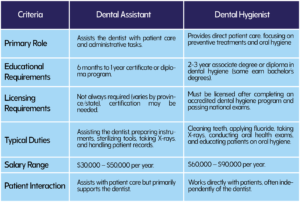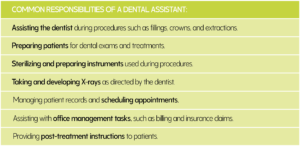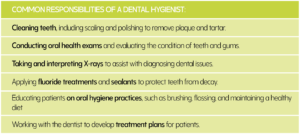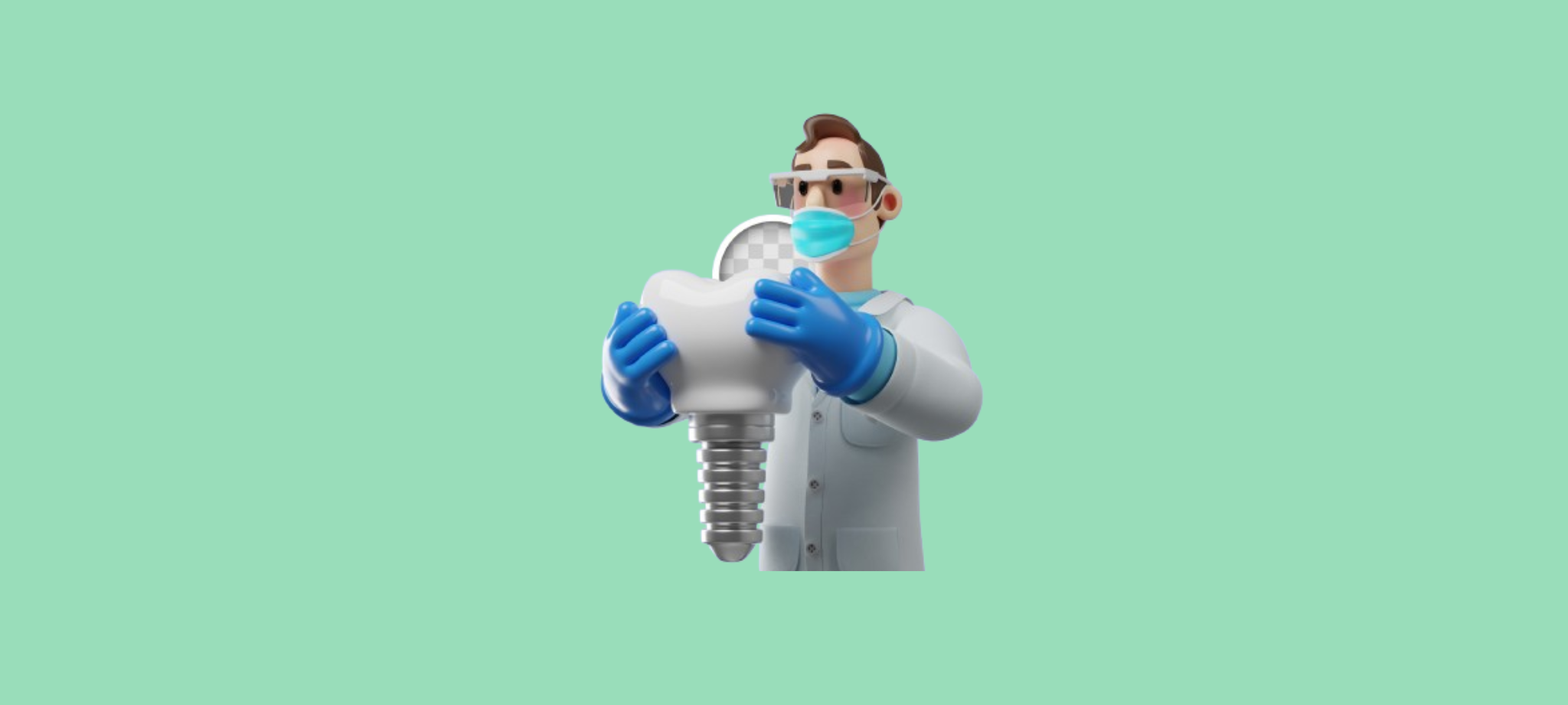Do you know what is the difference between a Dental Assistant vs Dental Hygienist?
Dental assistants and dental hygienists both play vital roles in a dental office, but their responsibilities, education requirements, and salaries differ.
This guide explains the key differences between a dental assistant and a dental hygienist, helping you understand their unique roles in patient care and the dental field.
What Is the Difference Between a Dental Assistant and a Dental Hygienist?
Dental assistants and dental hygienists both work closely with dentists to provide patient care, but their duties, education, and career paths differ significantly. Understanding the key distinctions between these two roles can help you decide which career in the dental field may be right for you or clarify the services you can expect from each professional during your dental visit.
Key Differences Between a Dental Assistant vs Dental Hygienist

Now let’s move on and talk about what each other do.
What Does a Dental Assistant Do?
A dental assistant works closely with the dentist during procedures, providing support by preparing instruments, handing tools to the dentist, and ensuring the patient is comfortable. Dental assistants perform both clinical and administrative tasks, making them an essential part of a smooth-running dental office.

Dental assistants have a more hands-on role in assisting with procedures and ensuring the dentist has the tools and environment needed for successful patient care. They may also interact with patients, but their duties are more focused on supporting the dentist rather than performing independent treatments.
Educational and Licensing Requirements for Dental Assistants
In most regions, dental assistants complete a 6-month to 1-year diploma or certificate program at a community college or vocational school. The program covers topics like dental terminology, patient care, infection control, and radiography (X-ray techniques).
Some provinces or states may require dental assistants to obtain certification or pass exams in areas such as radiography or infection control, while others do not. In Canada, for example, dental assistants may need to complete certification through the National Dental Assisting Examining Board (NDAEB), depending on the province.
What Does a Dental Hygienist Do?
A dental hygienist works more independently with patients, focusing on preventive dental care and hygiene. They clean teeth, conduct oral health exams, and educate patients on how to maintain optimal oral hygiene. Dental hygienists also work closely with the dentist to identify potential oral health issues, such as cavities or gum disease.

Dental hygienists play a vital role in preventive care, helping patients maintain their oral health and avoid more serious dental problems in the future. They often see patients on a regular basis for routine cleanings and exams and may be the first to notice signs of issues such as gum disease.
Educational and Licensing Requirements for Dental Hygienists
To become a dental hygienist, you need to complete a 2-3 year associate degree or diploma in dental hygiene, though some may pursue a bachelor’s degree for advanced career opportunities. Dental hygienists study areas such as anatomy, periodontology (gum disease), dental hygiene techniques, and radiology.
In Canada, dental hygienists must be licensed in their province by passing the National Dental Hygiene Certification Board (NDHCB) exam. Licensing is also required in other countries, with similar board examinations in place to ensure that hygienists are qualified to perform clinical procedures.
Dental Assistant vs. Dental Hygienist: Salary Outlook
Salary Comparison
One of the significant differences between a dental assistant and a dental hygienist is the earning potential.

Job Outlook
Both dental assistants and dental hygienists enjoy strong job prospects, with the dental industry continuing to grow. Preventive care is a priority in modern dentistry, leading to an increasing demand for hygienists. Similarly, as more dental offices open and procedures become more advanced, the need for skilled dental assistants remains high.
According to job market projections, both roles are expected to see above-average growth over the next decade, making them attractive career choices for those entering the dental field.
FAQs About Dental Assistants vs Dental Hygienists
1. What’s the primary difference between a dental assistant and a dental hygienist?
The primary difference is that dental assistants provide support to the dentist, assisting with procedures and administrative tasks, while dental hygienists work more independently, focusing on preventive care like cleanings, X-rays, and patient education.
2. How long does it take to become a dental assistant vs. a dental hygienist?
Becoming a dental assistant typically takes 6 months to 1 year through a certificate or diploma program, whereas becoming a dental hygienist requires a 2-3 year associate degree or diploma in dental hygiene.
3. Do dental assistants clean teeth?
No, dental assistants do not perform professional teeth cleanings. This is the job of a dental hygienist. However, dental assistants may help with preparing patients for cleanings and assist the dentist during procedures.
4. Do dental hygienists work independently?
Yes, dental hygienists often work independently with patients, performing cleanings, exams, and X-rays. They consult with the dentist if issues are found, but much of their work is done without direct supervision.
5. Can dental assistants become dental hygienists?
Yes, a dental assistant can become a dental hygienist by completing the required education and licensing for the hygienist role. Some assistants choose to advance their careers by enrolling in dental hygiene programs.
6. Is the salary of a dental hygienist higher than a dental assistant?
Yes, dental hygienists generally earn more than dental assistants. The average salary for dental hygienists ranges from $60,000 to $90,000, while dental assistants typically earn between $30,000 and $50,000 annually.
7. Is becoming a dental assistant a good career choice?
Yes, becoming a dental assistant can be a rewarding career, offering job stability, opportunities for growth, and a chance to work closely with dental professionals. It’s also a faster pathway into the dental field compared to becoming a dental hygienist.
8. What skills do you need to be a successful dental hygienist?
A dental hygienist needs strong communication skills, attention to detail, manual dexterity for handling dental tools, and a deep understanding of oral health to educate patients effectively and conduct cleanings.
Conclusion
While dental assistants and dental hygienists both play important roles in the dental office, they have distinct responsibilities, education requirements, and career paths. Dental assistants provide essential support to dentists, helping with procedures and administrative duties, while dental hygienists work more independently to provide preventive care and educate patients about oral hygiene. Choosing the right path depends on your career goals, desired salary, and the type of work you enjoy.


